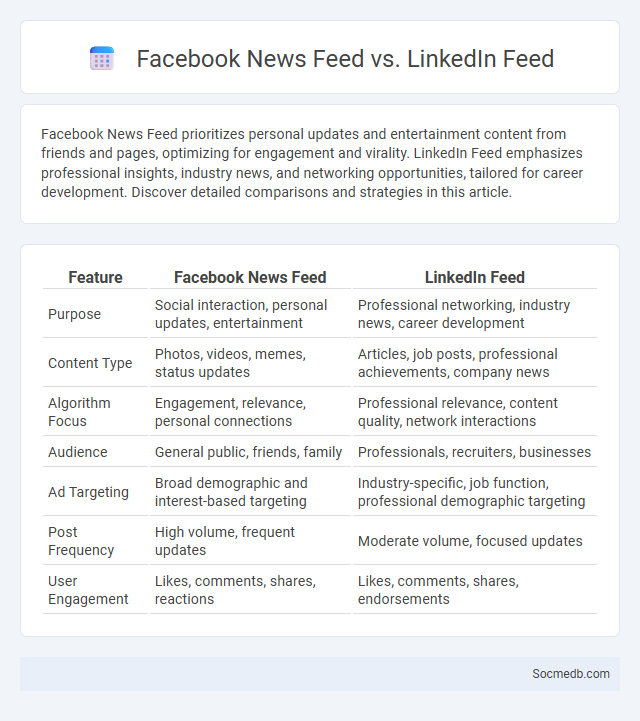
Photo illustration: Facebook News Feed vs LinkedIn Feed
Facebook News Feed prioritizes personal updates and entertainment content from friends and pages, optimizing for engagement and virality. LinkedIn Feed emphasizes professional insights, industry news, and networking opportunities, tailored for career development. Discover detailed comparisons and strategies in this article.
Table of Comparison
| Feature | Facebook News Feed | LinkedIn Feed |
|---|---|---|
| Purpose | Social interaction, personal updates, entertainment | Professional networking, industry news, career development |
| Content Type | Photos, videos, memes, status updates | Articles, job posts, professional achievements, company news |
| Algorithm Focus | Engagement, relevance, personal connections | Professional relevance, content quality, network interactions |
| Audience | General public, friends, family | Professionals, recruiters, businesses |
| Ad Targeting | Broad demographic and interest-based targeting | Industry-specific, job function, professional demographic targeting |
| Post Frequency | High volume, frequent updates | Moderate volume, focused updates |
| User Engagement | Likes, comments, shares, reactions | Likes, comments, shares, endorsements |
Overview of Social Media News Feeds
Social media news feeds serve as dynamic content streams curated by complex algorithms to prioritize user engagement and relevance. These feeds aggregate updates, posts, and multimedia content from friends, pages, and groups based on user behavior, preferences, and trending topics. Effective news feed optimization enhances user experience by delivering personalized, timely information that drives interaction and platform retention.
Key Features of Facebook News Feed
Facebook News Feed dynamically curates a personalized stream of posts, photos, videos, and links from friends, pages, and groups based on user engagement and algorithmic relevance. Interactive features such as likes, comments, and shares enhance community interaction while the algorithm prioritizes recent, relevant content to maximize user retention. Sponsored posts and targeted advertisements integrate seamlessly, using user data to deliver ads aligned with individual interests and behaviors.
LinkedIn Feed: Professional Networking Focus
LinkedIn Feed is a powerful tool for professional networking, enabling you to connect with industry leaders, share insights, and discover job opportunities. Engaging with relevant content and participating in discussions increases your visibility and credibility within your professional community. Optimizing your LinkedIn Feed with targeted posts and comments enhances your career growth and business development.
News Feed: Traditional vs Social Media
News Feed algorithms in social media prioritize personalized content based on user behavior, enhancing engagement compared to traditional news feeds that follow a chronological order. Your social media experience is shaped by data-driven recommendations, enabling real-time updates tailored to your interests. This dynamic approach contrasts with static traditional media, offering a more interactive and customized information flow.
Content Algorithms: Facebook vs LinkedIn vs News Feed
Facebook's content algorithms prioritize user engagement by analyzing likes, shares, and comments to deliver highly personalized News Feed experiences, boosting visibility for popular posts. LinkedIn's algorithm emphasizes professional relevance, prioritizing content that fosters networking, industry updates, and career growth within users' connections and groups. Both platforms use machine learning models to optimize feed ranking, but Facebook leans heavily on social interaction signals, while LinkedIn focuses on content relevance and user intent for professional advancement.
Audience Engagement and Interaction Styles
Maximizing audience engagement on social media requires understanding diverse interaction styles, such as reactive comments, direct messaging, and live video participation. Tailoring content to prompt user responses, including questions and polls, effectively boosts your social media presence. By leveraging authentic conversations and timely responses, you cultivate a loyal community that increases brand visibility and trust.
Personalization and Data Privacy
Social media platforms utilize advanced algorithms to deliver highly personalized content tailored to users' preferences, enhancing engagement and user experience. However, this personalization relies heavily on collecting and analyzing vast amounts of personal data, raising significant concerns about data privacy and security. Implementing robust privacy policies and transparent data practices is essential to balance personalization benefits with user trust and regulatory compliance.
Advertising and Sponsored Content
Social media platforms offer powerful advertising tools that enable precise targeting based on user demographics, interests, and behaviors, maximizing the reach and effectiveness of your campaigns. Sponsored content seamlessly blends with organic posts, increasing engagement and brand visibility while fostering trust among your audience. Utilizing these strategies can significantly enhance your marketing ROI and drive measurable business growth.
Content Discovery and Virality
Effective content discovery on social media platforms relies on algorithm-driven personalized feeds that match user interests and behavior patterns. Viral content spreads rapidly through shares, likes, and comments, often leveraging emotional appeal, trending topics, and influencer endorsements to amplify reach. Engagement metrics such as retention time, share rate, and hashtag usage play crucial roles in determining the virality potential of posts.
Choosing the Right Platform for Your Goals
Choosing the right social media platform for your goals depends on understanding the unique audience demographics and content formats each platform offers. Instagram excels for visual storytelling and reaching younger audiences, while LinkedIn is ideal for professional networking and B2B marketing. Tailoring your content strategy to the platform ensures higher engagement and better alignment with your marketing objectives, maximizing your social media impact.
 socmedb.com
socmedb.com